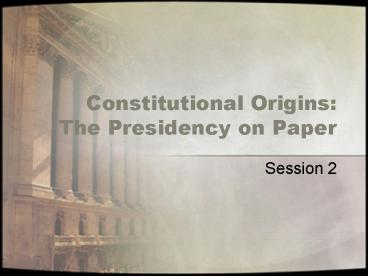Constitutional Origins: The Presidency on Paper - PowerPoint PPT Presentation
1 / 21
Title:
Constitutional Origins: The Presidency on Paper
Description:
The 1996 Schlesinger Poll (Continued from previous ) Average (High) Kennedy. 9 ... Niemi, Vital Statistics on American Politics, 5/e (Congressional Quarterly Inc. ... – PowerPoint PPT presentation
Number of Views:26
Avg rating:3.0/5.0
Title: Constitutional Origins: The Presidency on Paper
1
Constitutional Origins The Presidency on Paper
- Session 2
2
(No Transcript)
3
(No Transcript)
4
(No Transcript)
5
(No Transcript)
6
From McKenna The Drama of Democracy, 3rd Ed.
7
(No Transcript)
8
The Constitutional Convention
- . . . a new event in the history of mankind.
- The Constitution as DNA
- Some characteristics are good and what the
Founders intended - Some characteristics had unanticipated
consequences - He shall take care that the laws be faithfully
executed Article II, Section 3 - provides the basis for extraordinary claims of
power - manifestation depends on the individual and the
circumstances - The president shall recommend consideration such
Measures as he shall judge necessary and
expedient.
9
Antecedents
- The British king
- The colonial royal governors
- Executives created by state constitutions
- The Articles of Confederation
10
British and Colonial Executives
- The Constitutional Monarchy
- The kings power was limited by Parliament
- Parliaments laws could be vetoed by the king
- Overcame the limitations of rule by one person
(monarchy), rule by elites (aristocracy) and rule
by the people (democracy) because it involved all
three
- Colonial Governors
- Great powers An absolute veto, could dissolve
the legislature, created courts and appointed
judges - Was appointed by the king
- Used these powers cautiously because the
legislature controlled the governors salary
11
- Pitfalls of the king and colonial royal governors
- King bribed Parliament for control and colonial
governors behaved similarly abuses of power - The legislatures, in contrast, represented the
colonists interests
12
State Governors
- 17 state constitutions were written during the
course of the Revolutionary War - Strong legislatures, weak governorships and weak
judiciary - Governors terms were usually short and limited
- They shared powers with a council
- No veto
- Vague and weak powers
13
- One exception New York
- Elected directly by the people
- Three year term
- Could be reelected
- Office was unitary
- Veto power subject to override
- Appointment power subject to confirmation by the
legislature
14
Articles of Confederation
- Fear of a strong central government at its most
extreme - Equal power for each state
- Amendments to the Articles had to be approved
unanimously by the states - Powers technically rested with the Congress under
the articles, but it had no enforcement power or
power to tax
15
The Context National Problems
- States had overlapping claims to western lands
- On the coast, states taxed goods imported by
other states - Debt with no way to remedy debt
- Border problems on the northern, southern, and
western boundaries - A currency crises
16
The Lessons
- The design of an effective executive
- Energy and responsibility
- Unitary (just one person)
- Veto power
- Fixed salary
- Three equal branches of government
17
The Constitutional Convention
- The Annapolis Convention (1787)
- Shays Rebellion
- The delegates
- Self selection the contented stayed away
- Former and current members of Congress under the
Articles - Revolutionary War veterans
- Young
18
Creating the Presidency
- Why it required such great ingenuity . .
- Not something that lent itself to compromise
- Many examples of what they did not want, not so
many for what they did want - Deep ambivalence about executive power
19
So, What Happened?
- Vague became clear, weak became strong over the
course of the Convention - Greater clarity
- Madisons uncertainty and the Virginia Plan
- Clarity did not come quickly Committee of
Detail - Greater strength
- The starting point was an executive who was
subject to the legislature - During the convention, those in favor of a strong
executive won a series of victories
20
So, What Was At Issue? Unitary or Plural
- A unitary executive is proposed
- Cons this will grow into a monarchy
- A single executive will be able to act more
quickly - Responsibility can be attributed to an individual
more readily than to a group
- A plural executive is proposed
- This will provide for greater stability and
greater representation
Old versus young the older delegates favored a
plural executive because of their experiences
with the king and with colonial governors
21
So, What Was At Issue? A Council
- Unitary
- Energy, dispatch, responsibility
- A dual role for a judiciary would violate the
separation of powers - A council appointed by the legislature
- Council
- Can veto acts of the legislature
- An advisory council composed of the heads of the
executive departments
No consensus formed and the idea was abandoned.































